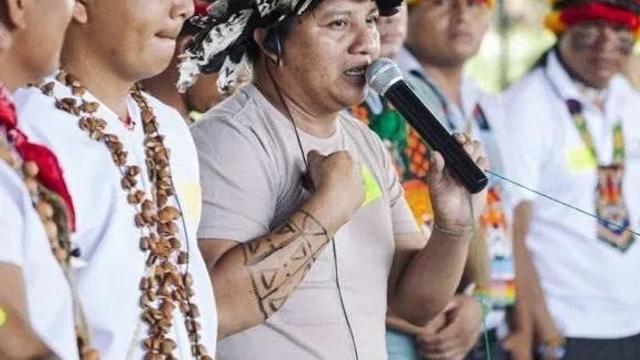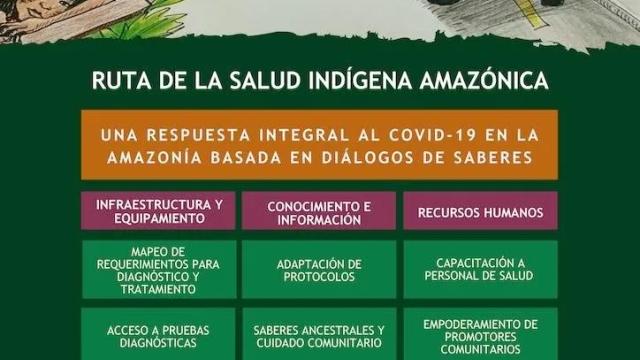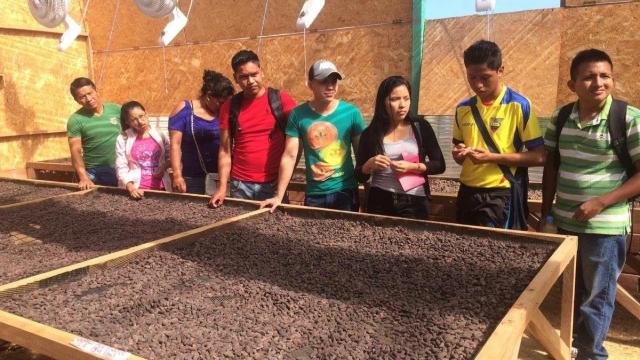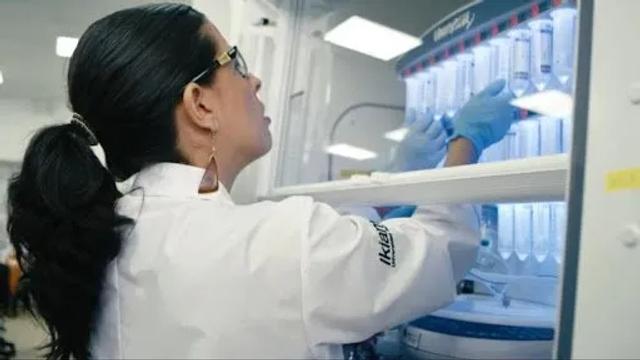Amazon Indigenous Health Route Wins 2020 SDSN Amazonia Award
The challenge of offering a comprehensive response to COVID-19 in the Amazon, focused on reducing disparities in health access faced by indigenous populations in the region, led to the creation of the "Amazon Indigenous Health Route," an initiative of the Hivos organization, through the All Eyes on the Amazon program. The solution was announced on Thursday, August 6, as the first prize winner of the 2020 SDSN Amazonia Award, promoted by the Sustainable Development Solutions Network for the Amazon (SDSN Amazonia).
The announcement took place during a virtual event, which brought together representatives of universities, research centers, and civil society organizations from Brazil, Ecuador, and Peru. In total, 11 projects competed for the award, launched in May this year, in partnership with the Sustainable Amazon Foundation (FAS), the German Cooperation Agency (GIZ) and the Friends of the Amazon Institute (iAMA), with the theme "Sustainable Solutions for Confronting COVID-19 in the Amazon".
“This issue is very relevant, given the context of the pandemic we are facing in the Amazon. Our greatest concern is the impact of COVID-19 in communities and villages in the deep Amazon, where the health system is extremely precarious, but also in urban areas where most of the population is concentrated,” said SDSN Amazonia Chair Virgilio Viana, at the opening ceremony.
Winners received cash prizes, with first place $2.000, second place $ 1.000, and third place $500.
Amazon Indigenous Health Route
The first place award went to Amazon Indigenous Health Route, which aims to reduce the gap in access to health services in the region by building a step-by-step management model, based on both the health system and the cultural realities of indigenous communities.
The Health Route established a cooperation with the Ministry of Public Health of Ecuador, received technical assistance from the Pan American Health Organization (PAHO), and works in coordination with other civil society organizations. For their field research, Hivos formed a technical team of professionals in the fields of medicine, anthropology, geography and communication, who led dialogues with representatives of indigenous peoples and local communities in the territories where the All Eyes on the Amazon program is implemented.
The objective, according to the organization, is to become a collaborative work model between academia, civil society and the public sector. The initiative also promotes health as a human right, and supports indigenous peoples’ access to care in Ecuador; they respond to other communicable diseases, contributing to the construction of an inclusive health system, focused on Amazonian individuals and peoples.
"We believe that the Amazon Indigenous Health Route is an innovative solution and that it solves structural problems, not only immediate needs; it also advocates for strategic changes to improve indigenous sovereignty in health," declared the director of the All Eyes on the Amazon program, Carolina Zambrano.
Biocommerce Course
In second place was a project to design a course in Biocommerce submitted by the Ikiam Amazon Regional University of Ecuador. The initiative, coordinated by professor and researcher Amr Radwan Ahmed Radwan, is committed to biocommerce as a generator of alternative and sustainable development for the Ecuadorian Amazon. Biocommerce is based on productive conservation, allowing economic prosperity and improving the quality of life of the population, while avoiding negative impacts on the environment, biodiversity resources and social contexts.
According to Radwan, the solution also has the potential to help the post-COVID Amazon economy recover. “Where would biocommerce be more relevant, if not in the Amazon? First, because it is one of the most mega-biodiverse regions in the world. However, at the same time, there is a huge dilemma: a mega-biodiverse region, with natural wealth and enormous ethnic, cultural and environmental diversity, but at the same time, with such a prevalence of poverty and a very low Human Development Index. And, with the COVID-19 crisis, the situation got a lot worse. So, Biocommerce represents an alternative of how we can have an economic reactivation, have economic prosperity, without damaging the environment and social contexts,” he explained.
Implemented in 2018, the course is the only one of its kind in Latin America and supports transformation processes and generates ventures based on native products, which can be placed in local, national and international trade. "We cannot bet only on conservation, without taking into account the quality of life of the communities. We cannot allow any type of economic development as oil and mining extraction, without taking into account all the negative impacts that this can have on the environment and social contexts" added Amr Radwan Ahmed Radwan, coordinator of the Biocommerce Course.
In addition, the course also seeks to improve access of inhabitants, especially the most vulnerable groups, such as indigenous communities, low-income people and women, to a high-quality university education fully aligned with the particularities of the Amazon.
COVID-19 Diagnosis
The third winner of the SDSN Amazonia Award was a proposal for the standardization of molecular techniques to detect the E and RdRP genes of Sars-CoV2 in suspicious clinical samples, also from the Ikiam Amazon Regional University.
The solution aims to improve diagnosis without the use of high-cost commercially-available kits, but instead with the adaptation of traditional protocols. This addresses both the shortage of kits and reagents for this type of analysis worldwide, while also offering considerable financial savings.
According to the project lead, Carolina Proaños, the initiative was designed to solve logistical and economic problems diagnosing of COVID-19 in the Ecuadorian Amazon. “In Ecuador, in the Amazon region, we did not have any laboratory that had the technical capacity to implement this type of diagnosis. What all the health centers and hospitals in the Amazon region were doing was sending the samples to the capital or to the largest cities in the country, to reach the diagnosis. The system was saturated, the response time of the results sometimes reached up to 15 days, generating a big problem, in addition to the cost involved in the logistics of transferring the samples.”
Currently, the Ikiam Molecular Biology and Biochemistry Laboratory is the only one in the Ecuadorian Amazon accredited for the molecular diagnosis of the disease. More than 2,800 samples from the provinces of Napo, Orellana and Pastaza have already been processed. Next month, researchers hope to include the province of Sucumbíos, in the north of the Amazon region, where they will work with a focus on the indigenous population, in partnership with Hivos.
The Award
This was the third edition of the SDSN Amazonia Award, which annually recognizes the best solutions to the most challenging problems for sustainable development in the Amazon.
The Award was open to solutions carried out and implemented by private, public, academic and third sector organizations in the eight countries and one province of the Amazon basin: Brazil, Bolivia, Colombia, Ecuador, Guyana, French Guiana, Peru, Suriname and Venezuela.
Proposals were submitted to four specific categories: access to health services, education, food, drinking water and sanitation; decent work and economic growth; sustainable consumption and production; and actions for the post-COVID period.
"The award, in reality, looked not only at COVID-19 itself, but fundamentally the categories that overlap, that interact, that make a dialogue with the issue of the pandemic," said the SDSN Amazonia Co-chair, Chair of the Scientific-Technical Committee of SDSN Amazonia and researcher at the National Research Institute of the Amazon (INPA), Adalberto Luis Val.
Amazon Solution Platform
The most relevant solutions initiatives will be published in the Amazon Solutions Platform for Sustainable Development of the SDSN Amazonia. This online, georeferenced and trilingual platform (Portuguese, Spanish and English) aims to promote the Sustainable Development Goals (ODS) in the Amazon.
The tool is a channel for the dissemination of solutions, defined as new technologies, business models and policies that have a transformative potential impact on the sustainable development of the region. Currently, more than 160 solutions are registered on the platform.
About SDSN Amazonia
SDSN Amazonia integrates the countries of the Amazon basin, mobilizing universities, non-governmental organizations, research centers, governmental and private institutions, multilateral organizations and civil society to promote the practical resolution of sustainable development challenges in the region. SDSN Amazonia is part of the United Nations Sustainable Development Solutions Network (SDSN) and hosted by the Sustainable Amazon Foundation (FAS).



